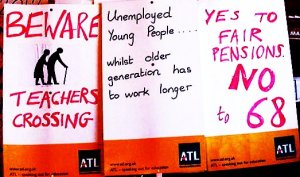
The Teachers' Pensions Debate
I watched Newsnight tonight and listened to Mary Bousted of the ATL present a strong and persuasive case for why the government is getting something seriously wrong regarding teachers' pensions.
I support most of what the government is trying to do, and I have no love for militant trade unions flexing their muscles.
However, when a professional association, ATL, which has never gone on strike in over a century suddenly says that it is calling its staff out, then I would suggest that a rethink is in order.
Teachers currently pay for other workers' pensions through their own tax. On top of that, they pay into their own pension schemes, deducted at source, 6% of income. The Government says that this must increase to 9% - up by half.
The pension scheme underwent massive changes in 2007, where adjustments were made to allow for people living longer. It was decided after these changes that the scheme was sustainable for the foreseeable future.
Now, four years later, we are told that an increase in contributions of 50% is needed, and that the pension will not be available on the agreed date - it will have to be be several years later.
Why?
What has happened to change the demography of the teaching profession in four years?
I don't like resorting to slogans, but the government's approach seems to be ....
......Country in debt? No problem - raid a pension scheme......
Is that really a basis for deciding how to look after our retired teachers?
Secondly, the Government has stated that teachers in private schools will be excluded from the Teachers' Pension Scheme if their intended reforms go through.
Mary Bousted, the ATL's general secretary, has said: "It seems truly bizarre for a government with a cabinet filled with MPs educated at public schools, to be planning to expel the 60,000 teachers working in private schools from the teachers' pension scheme."
This means that teachers will not be able to transfer between public and private sectors.
Hutton seemed ( http://cdn.hm-treasury.gov.uk/hutton_final_100311.pdf )
to be arguing that the scheme be closed to future, rather than current, entrants, but the ATL firmly believes those currently in the scheme might be thrown out.
Why wreck a perfectly good scheme?
Teachers are not particularly well paid compared with similarly qualified contemporaries, but they have always accepted this on the understanding that their pensions would be reasonable.
If the proposed changes go ahead, good graduates will not want to be teachers because they will be able to get better pay and conditions elsewhere. This would be disastrous for the long term future of the profession.
I'll let Mary have the last word:
"Perhaps the government would like to share the details of the impact on financial health of the TPS of losing all the private school teachers - around 60,000 people?"
ND comment: The actuarial valuation of the TPS has not been released by the government. Until this happens, meaningful negotiations cannot occur. The government knows this, but still does not release the figures.
It is widely believed by those in teaching, and hinted at in the recent report from the government's own Public Accounts Committee, that the TPS is not in deficit.
LINK... Mary Bousted and Kirsty Wark making a government representative look very uncomfortable in "Newsnight", 30 Jun 2011, on a day when hundreds of thousands of teachers went on strike.
Scurrilous reports abounded; one paper even talked about the half-million pound 'pension pots' of ordinary teachers on its front page.
I counted an astonishing 800 people assembled on Leicester's Victoria Park, which doesn't tally with Downing Street's description of the day as a 'flop'.
Full marks to Kirsty Wark and the BBC for a truthful presentation. Click on the link; the teaching bit is about 12 minutes in and lasts for another 10.
update- the impartial BBC has removed it... what a surprise....
UPDATE - 30 Nov 2011:
5,000 people gathered in Leicester to voice their protest at public sector pension cuts. According to ATL statistics, 180,000 teachers gathered at 23 rallies in different parts of the country to make clear to government that use of pension monies for non-pension purposes is unacceptable.

